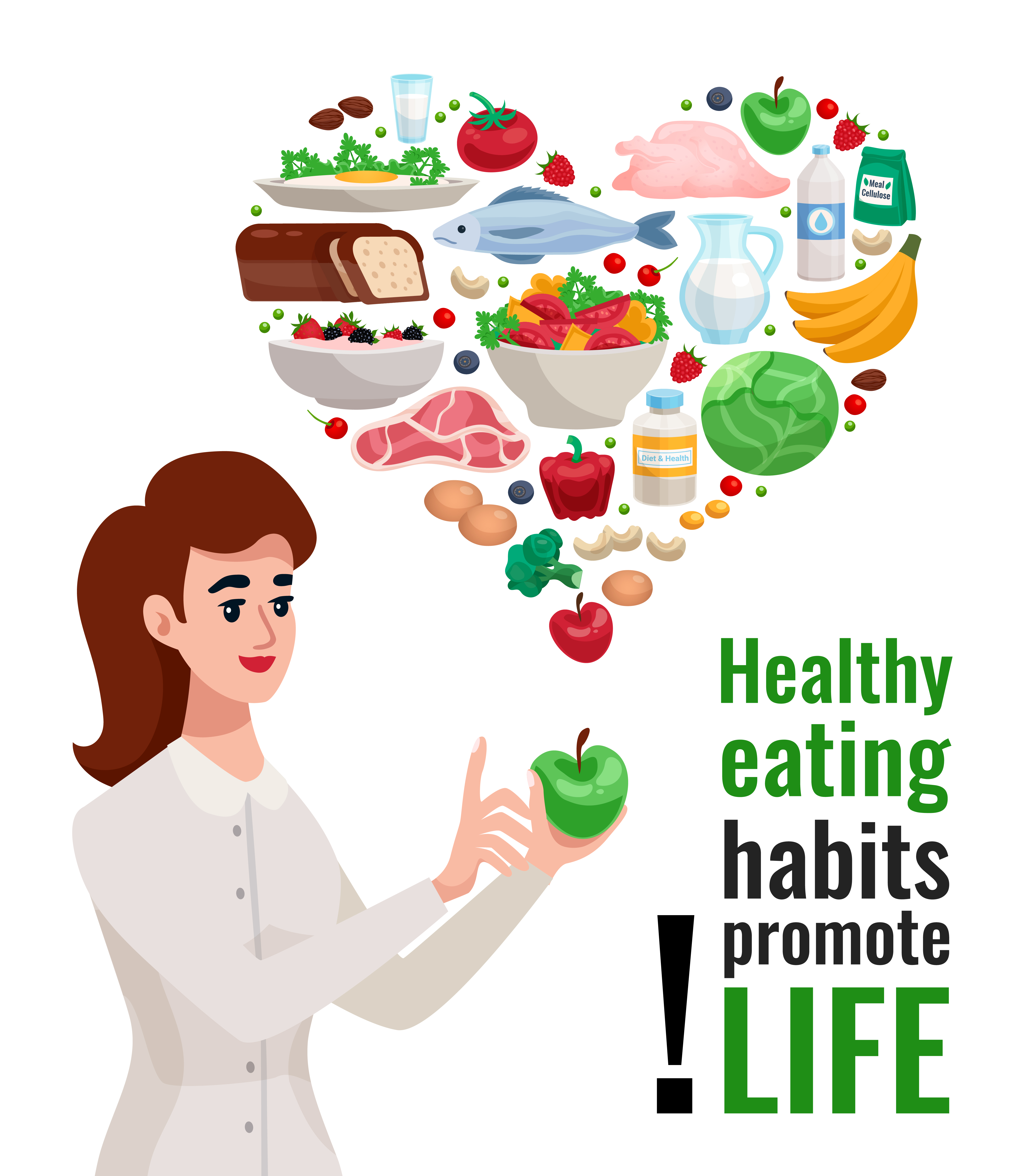How to Make Healthy Eating Habits for Healthy Life

With today's environmental conditions, such as ozone layer depletion and the rise of untreatable diseases, it's crucial to adapt our eating habits to better suit our health needs. As we advance technologically, we tend to engage in less physical activity and more mental work. Healthy eating must consider environmental conditions and work culture. In general, healthy eating involves consuming nutritious food required for your body. To develop healthy eating habits, you need to understand your body's health requirements within your daily routine. A healthy body requires a healthy balanced diet along with physical and mental exercise.
What Are Healthy Eating Habits?
Healthy eating habits involve consciously choosing a variety of foods, or a colourful plate, to provide appropriate nutrients such as calcium, iron, carbohydrates, vitamins, minerals, etc., to keep your body energetic, light, happy, and to maintain healthy organs and systems for overall well-being.
Here are the key elements of healthy eating:
Variation & Balanced Diet:
A healthy diet must contain a variety of food groups to ensure balanced nutrition. Here are the key components:
Fruits and Vegetables:
Adding seasonal fruits, vegetables, and grains to your diet fulfils your body's seasonal requirements.
Including a variety of fruit and vegetable groups provides essential vitamins and minerals.
Eat fruits whole instead of making juice to avoid increased sugar levels from juice.
Using green leafy vegetables increases fibre and iron intake, and adding citrus foods helps your body absorb and digest all nutrients.
You can drink vegetable juices for added nutrients.
Coconut water, watermelon, bottle gourd, etc., keep you hydrated in hot summer and provide good nutrients too.
Whole Grains: Whole grains like oats, quinoa, buckwheat, wheat, and brown rice are rich in fibre and nutrients. Using a variety of grains seasonally will add different nutrients to your meals.
Legumes and Nuts: Legumes like lentils, chickpeas, and soy, along with nuts and seeds, add protein to your diet, which is required for proper growth, development, and cell repair in our body.
Dairy: Dairy products are rich in calcium, vitamin D, and fulfil the need for other essential nutrients in our body.
Ghee and Cold-Pressed Oils:
Good Fats: Ghee and cold-pressed oils like mustard, peanut, and sunflower provide good fats for your body.
Joint Health: These oils help in mobilizing our joints.
Cooking Methods: Use proper cooking methods to retain the nutrients in these oils.
Indian Spices:
Essential Nutrients: Indian spices are a rich source of essential nutrients. For example, ginger and garlic are great immune boosters, while cumin and coriander seeds are good for digestion.
Antioxidant and Anti-Inflammatory Properties: Spices have antioxidant and anti-inflammatory properties that heal your body and offer medicinal benefits, such as turmeric.
By incorporating these elements into your diet, you can ensure that you are receiving a balanced and nutritious intake to support overall health and well-being.
Moderation & Portion Control:
Consuming a variety of foods in appropriate amounts and refraining from overeating is more beneficial for a healthy body. Having small, proportionate meals is good for health, as it aids digestion, improves gut health, and helps with healthy weight management.
Hydration:
Drinking plenty of water throughout the day keeps the body hydrated and helps release toxins. Adding lemon, mint, herbs, or cucumber slices to water makes it alkaline, which can reduce gastritis issues by keeping your intestine alkaline.
Know Your Body Needs:
Understand your body's needs according to your health conditions and add a variety of foods accordingly to get all necessary nutrients. For example, some people are allergic to citrus foods, but for others, citrus is essential for proper iron absorption and building immunity.
Less Added Sugar:
Avoid additional sugar. Instead, use dates, jaggery, or honey to provide sweetness as well as nutritional value to your meals.
Avoid Processed Food:
Avoid outside fried, junk, and fast foods to stay healthy. These foods are difficult to digest, increase body weight, and do not provide much nutritional value. opt for home-cooked food and healthier options instead.
Scheduled Intervals:
Regular meals and snacks on time help maintain energy levels throughout the day, prevent overeating, and ensure that body systems work properly.
Mindful Eating:
Eating mindfully means engaging all your senses—feel, smell, see, touch, and chew your food properly. This helps in absorbing all the nutrients, making the digestive process easier for your body, and improving overall well-being.
Conclusion:
In conclusion, with the increasing environmental challenges, evolving work culture, and rising health problems, it is essential to take care of our routine and maintain a healthy diet to stay happy, energetic, and healthy. By incorporating the traditional values of our culture, we can lead a better and healthier life.
We should also consider the need for health insurance in our daily lives. As healthcare continues to develop, it is also becoming increasingly unaffordable, making it crucial to have health insurance to access the right and good healthcare and to protect against unexpected financial burdens. Having a health insurance policy is a necessary step towards securing our well-being.
Disclaimer:
This blog aims to increase awareness about healthy eating habits and the importance of incorporating a variety of vegetables, fruits, whole grains, and other nutrient-rich foods into your diet. These foods provide essential nutrients that meet your body's requirements. However, for any specific and detailed dietary advice, it is crucial to consult healthcare professionals or nutritionists. Additionally, health insurance is vital for safety and security in medical emergencies. Please consult an insurance advisor to get the best policy according to your needs.

